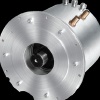|
European Green Cars Initiative PPP
Growing societal concerns about the detrimental effects of fossil fuel based road transport
on world climate, air quality, environmental heritage, and energy security are calling for
fundamental paradigm shifts. The future benchmarks of road transport consist in highest
energy efficiency, decarbonisation of energy carriers used in transport, and an overall
optimized performance of personal mobility and goods transport. Meeting these ambitious
goals requires breakthrough developments in a wide variety of technology fields ranging
from the production, storage and distribution of energy to the overall efficient use of any
kind of energy carrier in the car, new vehicle concepts and architectures, novel ICT solutions
and services, and to the management of mobility and logistics. Accelerated innovation will
be based on joint agreements of the involved economic sectors and the public authorities
on short-, mid- and long-term goals. To ensure a competitive edge for Europe in the field of
clean and energy efficient vehicles, the Public Private Partnership (PPP) European Green
Cars Initiative (EGCI) is presenting the document at hand.
This strategic multi-annual roadmap is aimed at defining the research and development
objectives to be achieved by the PPP EGCI. It has been prepared by the Ad-hoc Industrial
Advisory Group, a forum for discussions about the content of the EGCI between the involved
industries and the European Commission services. The members are industry representatives
from four European Technology Platforms, ERTRAC (European Road Transport Research
Advisory Council), EPoSS (European Technology Platform on Smart Systems Integration)
SmartGrids (European Technology Platform for the Electricity Networks of the Future), and
EIRAC (European Intermodal Research Advisory Council). This unique cooperation between
different industrial sectors reflects the importance of the integrated approach, which has to
be adopted in order to achieve the ambitious objectives of the initiative. Also, taking a system
approach to transport addressing systemic challenges such as decarbonisation is in line with
the upcoming White Paper on the European Transport Policy, to be issued in the coming
months by the Commission. It also reflects the approach taken by the European Commission
in its Communication on a European strategy for clean and energy efficient vehicles, published
on the 28th of April 2010.
When looking to a more efficient Road Transport System as a whole, major challenges appear
and call for breakthrough developments in a variety of technology fields. The EGCI roadmap
comprises three pillars: electrification of road transport, long distance transport, and logistics
and co-modality. These three pillars represent the key areas to achieve energy efficiency
improvements, CO2 emissions reductions and reliable logistics and mobility. At the same time,
they represent important opportunities for Europe to turn its outstanding knowledge base in
the field of clean and energy efficient vehicles and transport solutions into innovations
bringing substantial benefits both environmentally and socio-economically. European
industrial sectors must develop the next generation of vehicles and mobility solutions, taking
care of the environmental impacts of transport with a life-cycle approach (including vehicles
recycling and re-use), and adopting a system approach to address the mobility needs.
The electrification of road transport is of specific importance in the context of growing
urbanization in Europe, and considering the high potential of electrified mobility for climate
protection, resources management, and air quality. The electrification includes the
development of full electric vehicles (FEVs) specifically designed for use in the urban
environment (typical daily range of 50km), as well as plug-in hybrids (PHEVs) and vehicles
equipped with a range extender, capable of longer trips within and between cities. The
electrification represents therefore a great potential to be seized by Europe’s automotive and
energy industries, requiring coordinated efforts of these sectors, in partnership with public
authorities. At stake is the global competitiveness of Europe, and considering the great share
of these sectors to EU employment, a unique occasion to achieve the objective of smart,
sustainable and inclusive growth defined in the Europe 2020 Strategy. Turning such
innovative vehicles into viable products ready to mass markets requires significant
technological innovations addressing a series of major challenges, including: cheap, safe and
high-performance energy storage, vehicle-to-grid interfaces, thermal management, advanced
drive-train control, robustness and safety as well as the seamless integration into the
transport system. Together with these technological innovations, the future generations of
vehicles request efforts in the view of components standardization, sub-systems
modularization, and new manufacturing requirements: costs reduction and ability to respond
to demands variations will there be key driving forces towards success in mass markets
uptake. In this respect, the two PPP EGCI and Factories of the Future have interesting
interactions to develop, in particular for integrated product-process approaches and new
materials aspects, with the objective of sustainable high performance manufacturing of the
next generation of vehicles. Underlining the legitimacy of public private partnerships for this
matter, the electrification of road transport requires in addition careful demand-side
measures and timely regulatory frameworks, for which a shared knowledge of the
expectations and the challenges are of high value. In partnership with industry, the European
Commission and EU Members States have with these measures key policy tools able to act as
leverage effect towards the mass market uptake.
While this electrification of passenger cars and light-duty vehicles is predicted to increase over
the next decade and to be implemented progressively in our cities, the powertrains of heavyduty
vehicles necessary for long distance transport are expected to remain based on the
internal combustion engines. Although the powertrains of the commercial vehicles are already
very optimized towards fuel efficiency, the predicted increase in goods transport demand
requests that new technologies are investigated in order to compensate the overall increase
of fuel consumption and its effect on the carbon footprint of freight transport. These efforts
towards more energy efficient trucks must cover three main areas of R&D: vehicle efficiency,
driveline efficiency, and driver efficiency. And such as for electrification, timely developments
are also necessary in the view of demonstrations, production, market introduction, and
regulatory frameworks. At the same time, CO2 emissions from freight transport can be further
reduced through measures to optimize the use patterns of vehicles and the logistics schemes
in general.
read more
|
|
Какъв автомобил бихте закупили?

|
Декември 2025
|

|
|
| Нед |
Пон |
Вто |
Сря |
Чет |
Пет |
Съб |
| | | | | | | | | | | | | | | | | | | | | | | | | | | | | | | | | | | |
|














